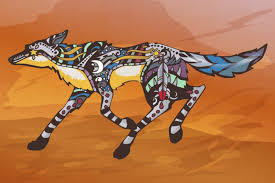Thinking back on the banishment of the younger twin from Robinson’s story, the “written document” feels almost like the apple (i.e. forbidden knowledge) from the Garden of Eden story from the Bible. Before I continue, I must preface these thoughts with the fact that I am not a religious person; I have never read anything associated with the Bible, all my knowledge comes from pop culture, and mostly satire at that.
To refresh your memory, in Robinson’s story, “the young twin stole a written document . . . he had been warned not to touch” (14) leading to his sudden and abrupt banishment that left “[t]he elder twin . . . in his place of origin” (14). Reading this segment, I cannot help but think that this banishment caused for the younger twin to lose his connection to the land that the elder twin, the representation of Indigenous peoples, maintains. While studying Indigenous history and their stories, the theme of spirituality and a connection to the land is often brought up; this connection is somewhat lost on those of European descent.

Coyote the Trickster by coyoteflutesong on DeviantArt
If we look at the written document that Robinson describes the younger twin to have stolen and read as being a forbidden knowledge, much like the apple that Eve and Adam ate of, perhaps it can be thought of as somehow disconnecting people from the land. Descendants of the younger twin in Robinson’s story continue to “[conceal] the contents of the ‘paper’” (14) when eventually they land back on North American soil. Therefore, it seems that by reading the document, those that descended from Coyote (the elder twin) would lose the relationship of “stewardship . . . for the land (and sea) and all of the creatures that inhabit the land with them” (“First Nation Relationship to the Land”).
I would be interested to know when Robison’s story was first told. We are told in the Introduction to “Living by Stories” that when the “whites had landed on the moon, [Robinson] immediately incorporated this detail into his story” (57) of another one about Coyote. I cannot help but wonder about other incorporations as Lutz speaks about how Indigenous peoples of the past weren’t “interested in replacing their own spiritual beliefs and powers with Christian ones. [Rather t]hey sought to add the spirit powers of the whites to their own” (“Frist Contact” 44). This suggests to me that Robinson’s story is influenced by the Bible (whether from his own creation, or from past storytellers that he learned from).
I wonder about how incorporating Christianity into Indigenous culture may have gone if left to the people to decide rather than have it forced upon them by European colonists. I found an interesting, yet short read, about the rise in Christian Indigenous peoples in Canada according to the 2011 National Household Survey. Looking at the graphic representing the Indigenous populations religious beliefs, I cannot help but feel disheartened. While I recognize a lot of these conversions more than likely didn’t happen on the friendliest of terms, to hear that they are rising brings up concerns that I feel were expressed by Robinson about the disappearance of proper story tellers (i.e. those learned in the ways of Indigenous culture).
Work Cited
coyoteflutesong. Coyote the Trickster. DeviantArt, Jan 6, 2011. https://www.deviantart.com/coyoteflutesong/art/Coyote-the-Trickster-192406629. Accessed Feb 22, 2021.
“First Nation Relationship to the Land.” Indigenous Corporate Training Inc., May 7, 2015. https://www.ictinc.ca/blog/first-nation-relationship-to-the-land. Accessed Feb 22, 2021.
Lutz, John. “First Contact as a Spiritual Performance: Encounters on the North American West Coast.” Myth and Memory: Rethinking Stories of Indigenous-European Contact. Ed. Lutz. Vancouver: U of British Columbia P, 2007. 30 – 45. Print.
Robinson, Harry. “Introduction.” Living by Stories edited by Wendy Wickwire. Talonbooks, 2005. 8 – 62. eBook.
Todd, Douglas. “Indigenous Christianity on the rise in Vancouver and beyond.” Vancouver Sun, Dec 11, 2017. https://vancouversun.com/news/staff-blogs/indigenous-christianity-on-the-rise-in-vancouver-and-beyond. Accessed Fed 22, 2021.